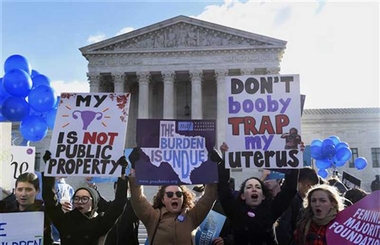Abortion debate returns to depleted Supreme Court

WASHINGTON (AP) — The abortion debate is returning to the Supreme Court in the midst of a raucous presidential campaign and less than three weeks after Justice Antonin Scalia's death.
The justices on Wednesday were taking up the biggest case on the topic in nearly a quarter-century, considering whether a Texas law that regulates abortion clinics hampers a woman's constitutional right to obtain an abortion.
The clinics want the court to roll back regulations requiring doctors who perform abortions to have admitting privileges at nearby hospitals and forcing clinics to meet standards for outpatient or ambulatory surgical centers. Like other states, mainly in the South, Texas says it passed the measure to protect women's health.
On the sidewalk outside the court Wednesday morning, dozens of anti-abortion protesters chanted "pro-life, pro-woman" while hundreds of abortion rights advocates nearby shouted "abortion is a human right."
Justice Anthony Kennedy probably holds the deciding vote on the eight-justice court. He already joined with the court's four liberal members to block some restrictions from taking effect while the case was on appeal.
If Kennedy sides with the liberal justices, the case could stand as an important reaffirmation of the standard the court first laid out in 1992 that allows states to regulate abortion provided the restrictions do not impose "an undue burden" on a woman's right to an abortion.
Scalia's death means it is likely that Texas can get no more than four votes on a court that has been starkly divided between conservatives and liberals on the issue of abortion.
A 4-4 tie in this case would leave Texas' law standing, because the federal appeals court in New Orleans ruled for the state. Such an outcome would allow Texas to put the regulations into full effect. The clinics say no more than about 10 facilities will remain open, where there once were more than 40 before the law was enacted in 2013.
If the court is evenly divided, the justices could decide to rehear the case once a new colleague joins them. President Barack Obama says he will nominate a successor to Scalia. But Senate Republicans, backed by the party's presidential candidates, have pledged to keep Scalia's seat empty so that the next president can fill it after taking office in January 2017.
Separately, the justices also are mulling an emergency appeal from clinics in Louisiana. The same federal appeals court has allowed that state's admitting privileges law to take effect while a legal challenge winds its way through the courts, even after a trial judge struck it down as unconstitutional. The case is being appealed.
A decision in Whole Woman's Health v. Hellerstedt, 15-274, is expected by late June.
By Mark Sherman. Copyright 2016 The Associated Press.
The Gayly- 3/2/2016 @ 10:06 AM CST





